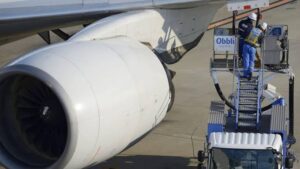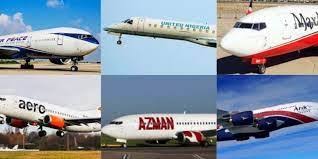The aviation industry in Nigeria is currently grappling with significant challenges. A recent meeting between the National Association of Nigerian Travel Agents (NANTA) and the Nigerian Civil Aviation Authority (NCAA) brought these issues to light.

According to the Director General of NCAA, Capt. Chris Najomo, the primary cause of rising domestic airfares is the reduction in operational aircraft within the industry. This shortage is severely impacting the sector’s ability to meet the increasing demand for air travel.
The grounding of Dana Air due to safety concerns and the recent seizure of three Arik Air aircraft have contributed significantly to the decline in the number of operational planes. On July 30th, the Minister of Aviation and Aerospace Development, Festus Keyamo, enforced the grounding of Arik Air’s aircraft following a Federal High Court ruling. The court ordered the sale of the airline’s planes to settle a $2.5 million debt owed to Mr. Arthur Eze by Arik Air’s founder, Johnson Arumemi-Ikhide.
This drastic reduction in available aircraft has led to widespread concerns within the industry. Aviation experts argue that this decrease in fleet size is creating a capacity shortage, which in turn drives up airfares. However, others believe that the rising costs of operating airlines, such as fuel prices and foreign exchange shortages, are the real culprits behind the skyrocketing ticket prices.
Aviation unions, including the National Union of Air Transport Employees (NUATE), have voiced their concerns about the impact of these actions. They argue that the grounding of Dana Air and the seizure of Arik Air aircraft have resulted in the loss of over 2,000 direct jobs, affecting countless dependents. These unions warn that such actions could exacerbate the economic hardships faced by those in the industry, including airports, ground handlers, fuel suppliers, and catering services.
In a joint letter to President Bola Tinubu, the unions emphasized the ripple effect of these airline groundings on the entire aviation sector. They highlighted the negative consequences of these actions on the earnings of aviation agencies and third-party vendors, urging the government to reconsider its approach.
While some experts, like Dr. Alex Nwuba, President of the Aircraft Owners and Pilots Association (AOPAN), argue that the removal of over 2,000 daily seats from the market by Dana and Arik has had a severe impact on air travel, especially during peak seasons, others hold a different view. Amos Akpan, another aviation expert, believes that the issue lies more in the economic challenges faced by the industry, rather than a genuine capacity shortage. He contends that factors such as foreign exchange shortages and high operational costs are more significant contributors to the decline in operational aircraft.
To address these challenges, experts suggest a range of solutions. Dr. Nwuba believes that the Federal Government, through agencies like AMCON and the Ministry of Aviation, should provide financial support to struggling airlines like Arik. He argues that resolving the identified issues with Dana Air swiftly could save jobs and improve market conditions.
Galadima Abednego, the national president of NAAPE, advocates for stronger policies to ensure a consistent fleet of operational aircraft. He stresses the importance of building efficient Maintenance, Repair, and Overhaul (MRO) facilities within Nigeria to reduce the need for airlines to send their planes abroad for maintenance.
The Nigerian aviation industry is at a critical juncture. The reduction in operational aircraft, driven by a combination of safety concerns, economic challenges, and regulatory actions, is straining the sector’s capacity.
As airfares continue to rise, it is clear that urgent action is needed to stabilize the industry and ensure that it can meet the growing demand for air travel. Whether through government intervention, policy reforms, or investment in domestic infrastructure, the future of Nigerian aviation depends on finding effective solutions to these pressing challenges.




